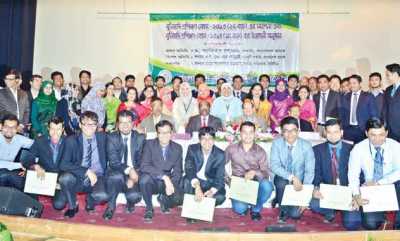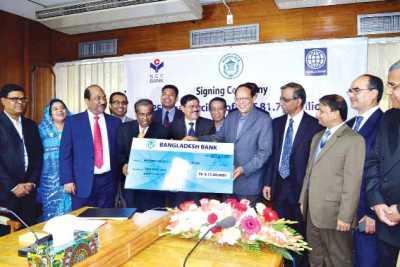Banking
BB’s timely policies keep economy on track: Atiur

The central bank Governor on Sunday said the country’s economy remained on track despite many external and domestic shocks as the regulator could take timely policies.
“In the face of the ongoing global meltdown and recent internal political instability, advancing the economy was a major challenge,” said Dr Atiur Rahman.
“To address that challenge, Bangladesh Bank has taken timely monetary policy, loan policy and investment and business-friendly policies and steps. So, most economic indicators remained positive despite an adverse situation,” the Governor remarked.
Dr Atiur was addressing as chief guest a programme of BB’s fresh officials at the Bangladesh Bank Training Academy at Mirpur.
He told the fresh officials that the size of the country’s economy and depth of the financial sector has increased remarkably in last five years. The challenge for the central bank also increased simultaneously, he added.
BB’s financial inclusion campaign has helped widen the economic depth quickly, he said, adding that agriculture, SME and banking sectors’ contribution also helped maintain the economic stability.
In last five years, the number of banks rose to 56 from 48 and the number of bank branches increased from 6,886 to 8,560, the Governor informed.
Meanwhile, opening of bank accounts witnessed a 63 percent hike to reach 6.12 crore and ten-taka accounts for the poor also soared to 1.33 crore during the period, he also mentioned.
Key macro economic indicators, including GDP growth, inward remittances, reserve, exports and imports, were stable in last five years, which showed “economic resilience” of the country, he said.
He noted that because of close observation and market-based monitoring by the central bank, the inter-bank money market, the foreign currency market and exchange rates remained stable.
And at the same time, inflation was in control even though it heated up in last two months because of supply chain disruption due to political violence.
The governor called upon new officials to put their full efforts to turn the institute a centre of excellence and a world-class central bank.
BB Deputy Governor SK Sur Chowdhury was also present at the event as the special guest.
BRAC Bank employees run marathon for humanity
The employees of BRAC Bank organised a marathon titled “BRAC Bank DAUR 2014 – Kolyaner Pothochola” to raise fund for humanity. Benazir Ahmed, commissioner, Dhaka Metropolitan Police, was present as the chief guest at the annual marathon for humanity at Hatirjheel on Friday. Syed Mahbubur Rahman, managing director and chief
executive officer, BRAC Bank Limited, Management Committee Members of BRAC Bank and its subsidiaries were also present. The marathon started at 7:00 am in the morning. A total of 2,000 employees from BRAC Bank participated in the marathon that started from Police Plaza Point of Hatirjheel Point and ended at the same point covering 5.2km. On the occasion, the employees raised a fund of more than Tk 1.2 million, and the company doubled it to Tk 2.45 million from its CSR fund. BRAC Bank first started the marathon for humanity in 2011.
BRAC Bank donated Tk 1 million to Bangladesh Protibondhi Foundation that works for the welfare of disabled and disadvantaged children with educational, healthcare and vocational support. After the marathon, Syed Mahbubur Rahman, Managing Director & CEO, BRAC Bank Limited, handed over the cheque to Dr Shamim Ferdous, executive director, Bangladesh Protibondhi Foundation.
News:/The Independent /05-Feb-2014
Exim Bank sets largest corporate human logo
 EXIM Bank has set a new record in Asia by forming the largest human corporate logo in the country.
EXIM Bank has set a new record in Asia by forming the largest human corporate logo in the country.
In a magnificent display of unfaltering love for the bank, thousands of participants including executives and officials raised red and green placards above their heads to form the Asia’s largest human corporate logo at the Army Stadium in Dhaka on Saturday.
Chairman of the bank Md. Nazrul Islam Mazumder was the chief guest where Directors of the bank were present as special guest.
BB to provide Tk 81m for financing CWTP at Comilla EPZ

Bangladesh Bank will provide Tk 81.76 million loan to NCC Bank Limited for financing a Central Water Treatment Plant at Comilla EPZ.
NCC Bank signed a facility access agreement with Investment Promotion and Financing Facility (IPFF) Project Cell of Bangladesh Bank for availing IPFF fund under IDA Credit of World Bank on Thursday.
Dr. Atiur Rahman, Governor of Bangladesh Bank attended the signing ceremony as chief guest.
Mohammed Nurul Amin, Managing Director of NCC Bank and Md. Abul Quasem, Deputy Governor of Bangladesh Bank and Project Director of IPFF Project Cell signed the agreement on behalf of their respective organisations.
BB wants mobile bankers to get access to NID server
Bangladesh Bank has urged the Election Commission to allow banks to access into its NID (National Identity) server so they could increase mobile banking accounts or wallets and help deepen the financial inclusion.
“Unlike other countries, it is not common in Bangladeshi to carry NID, which is hampering adoption of wallet,” Governor Atiur Rahman told a function in Dhaka yesterday.
“There is, therefore, a need for awareness campaign of carrying NID and allowing access to NID by mobile bankers.”
He was addressing a function to release a survey report on “Mobile Financial Services (MFS): Consumer Insights” at a city hotel.
pi Strategy Consulting and Consultative Group to Assist the Poor (CGAP) of World Bank jointly launched the survey findings at the function.
National Board of Revenue also uses the EC NID server in the process of registering the TINs.
According to the report, only 3% MFS customers transacted money using their own accounts, 52% through agents, 35% through either sender or receiver accounts and 10% through courier services.
The governor said it is natural that survey at agent points would be dominated by non-account holder customers. “Due to low transaction limit, some find it convenient to send money through agents.”
There is a general perception that opening an account is a cumbersome process-which indirectly promotes using agents.
The current form of registration, which doesn’t allow people to instantly open an account, significantly slows the process of financial inclusion – as people want to open accounts on the spot and transfer funds instantly.
However, self-wallet-use is increasing as many elements (i.e. airtime, loan repayment, merchant payment, school fee payment) are coming in the ecosystem and, time to time, one should study how the adaptation is increasing.
Atiur said most of the cash-ins are happening in major metro cities while cash-outs are spreading to the rural areas making significant contribution in terms of financial inclusion and there by inclusive growth.
“In cash-in markets, customers don’t feel the need to open an account, however, in the cash-out markets, there is a higher need to register and open an account.”
He said there are big differences in regulatory perspective -ours is bank-led model while others in the globe may not be so.
“It is a light-touch regulated. Normally central bank is heavy handed but I had to change mindset to understand that many are not educated.”
Pial Islam, managing partner of the consulting firm, presented the survey and said the research is expected to assist industry players as well as the regulator to gain important insights about MFS end-users.
According to the survey nearly 48% of the MFS users reside in urban areas while 32% in rural and 20% in semi urban areas. A big gender gap among the users, only 18% of them are female and the average monthly income of the MFS users is Tk8007, which is higher than the national average income, and nearly three times higher than the poverty line average income.
More than four-fifths of the users transfer funds between the members of same economic households. The study reports that those who are using mobile banking, tend to conduct more frequent transactions of lower monetary value compared to their own funds transfer patterns in the past.
A significant number of people have been opening wallets, especially over the last few months. Some 25% of those surveyed are wallet owners.
Among the MFS users, noticeable differences were observed in the study between wallet owners and those who don’t have wallets.
Early adopters of wallet are typically younger, better educated, earn more and have better English proficiency than non-wallet MFS users.
Islam said: “This raises some important questions about impact of MFS towards financial inclusion. Are the unbanked, less educated and poorer segments of our population being served through MFS in a significant way yet?”
By now, 28 banks have MFS permission and 19 are in active operation that includes BRAC Bank’s dedicated MFS, bKash. Key players in MFS are bKash, DBBL Mobile Money and M-Cash of IBBL with13.2mn registered customers with about 2 lakh agents nationwide generating (on average) more than 1.0 million transactions amounting more than Tk2.21b per day.
News:Dhaka Tribune/08-Feb-2014



